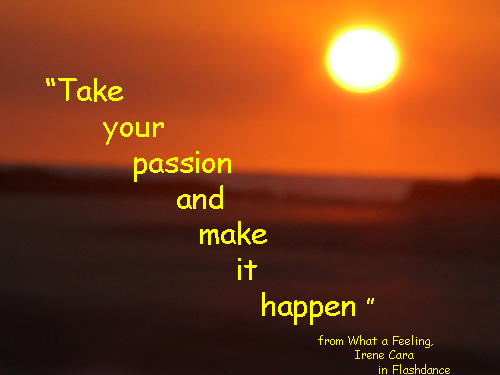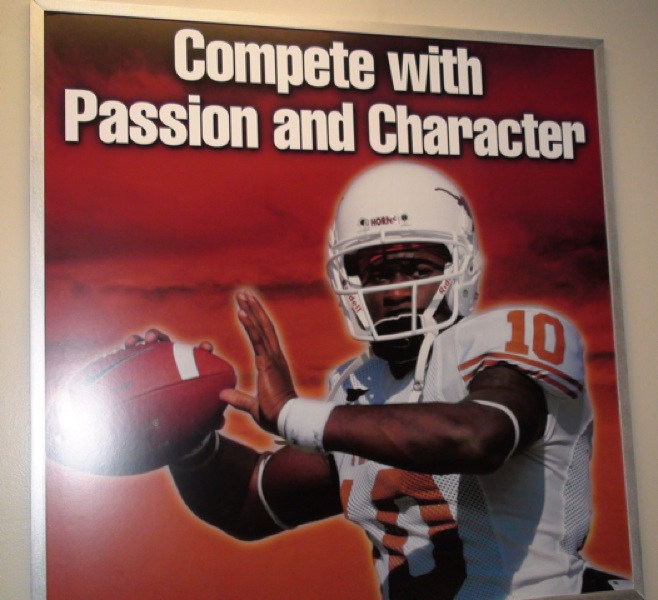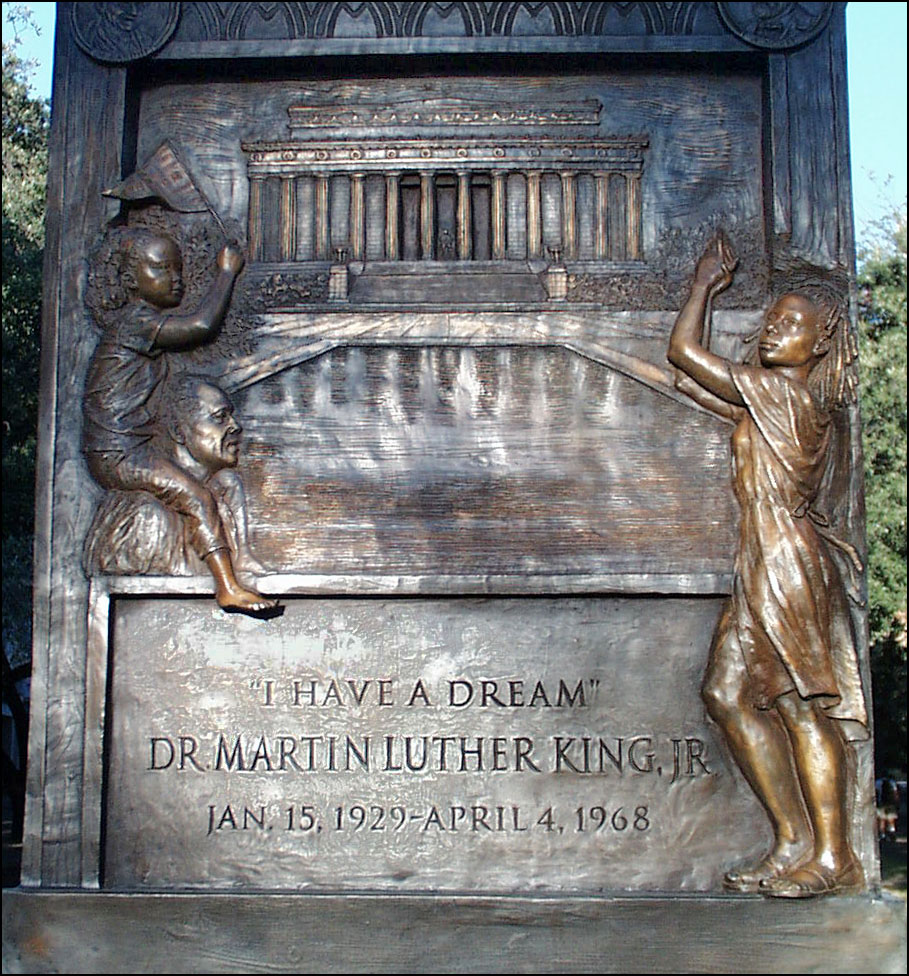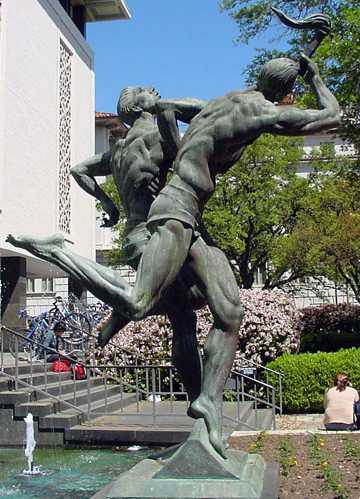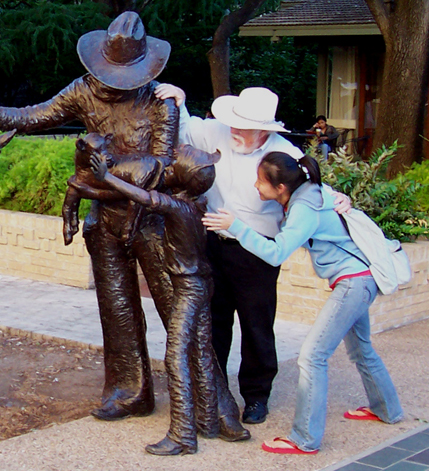MAKE SURE TO "REFRESH" YOUR SCREEN EACH TIME YOU VISIT THIS PAGE TO GET THE LATEST VERSION
"Only
connect! . . .Live in fragments no longer.”
E.
M. Forster, Howards End (1910), ch. 22
‘One
day when I was twenty-three or twenty-four this sentence seemed to
form in my head, without my willing it, much as sentences form when we are
half-asleep, ‘Hammer your thoughts into unity’.
For days I could think of nothing else and for years I tested all I did by that
sentence [...]” William Butler Yeats (cited in Frank Tuohy, Yeats, 1976,
p.51 )
PROJECT
TWO
Like project one, this
is a multimedia essay of at least fourteen hundred words (four pages
or so.
Like project one, you
will be evaluated on your coherence (organization),
hammering your thoughts and feelings into unity (flow), putting
the best word in the best place, conciseness, and using punctuation
to lead the reader.
But the 140 points that was devoted to the complete writing rubric in P1 will now be devoted to your three areas of concentration as specified on the upper right of your P1 instructor critique.
Each of the three areas will be worth forty-seven points, and each error or infelicity will result in a deducation of at least two points. Errors and infelicities in the other rubrics will still be deducted, but at the rate of one point each.
PROJECT
TWO
Like project one, this
is a multimedia essay of at least fourteen hundred words (four pages
or so.
Like project one, you will be evaluated on your coherence (organization), hammering your thoughts and feelings into unity (flow), putting the best word in the best place, conciseness, and using punctuation to lead the reader.
But the 140 points that was devoted to the complete writing rubric in P1 will now be devoted to your three areas of concentration as specified on the upper right of your P1 instructor critique. Each of the three areas will be worth forty-seven points, and each error or infelicity will result in a deducation of at least two points. Errors and infelicities in the other rubrics will still be deducted, but at the rate of one point each.
Like project one, you will be evaluated on your coherence (organization), hammering your thoughts and feelings into unity (flow), putting the best word in the best place, conciseness, and using punctuation to lead the reader.
But the 140 points that was devoted to the complete writing rubric in P1 will now be devoted to your three areas of concentration as specified on the upper right of your P1 instructor critique. Each of the three areas will be worth forty-seven points, and each error or infelicity will result in a deducation of at least two points. Errors and infelicities in the other rubrics will still be deducted, but at the rate of one point each.
NATURAL SCIENCE MUSEUM OPTION
For, Against, or ......: "The Science Museum on campus is so essential to our ethical treatment of animals that it should be funded by the State of Texas."
Required: quotes from at least two different research sources, and at least one quote from your own interview with someone involved in the controversy.
ZOO OPTION
For, Against, or ...... "The xxxxx* zoo should be shut down because the treatment of animals there is unethical."
Required: At least one unique quote from a book not available in any way on the internet**
and a monologue from the point of view of one of the animals in the zoo (at least three-hundred words, like the first part of P1).
*A major zoo that you personally visit for this assignment. **Such as Reading Zoos (a library book checked out by the instructor), a book the instructor has made available to y 'all via Crab who can loan it out and then make sure your quotes are unique.
PASSION OPTION






The primary option will be to focus on the one passion that best connects you to something greater than yourself, best benefits others, and produces a leadership vision that changes the world for the better.
WHAT IS YOUR PASSION FOR HELPING OTHERS?
AT LEAST ONE CITATION FROM PAGES 353-415 IS REQUIRED (see "Role Models" below).
EXTRA POINTS FOR CITATIONS FROM PAGES 80-82, 86-7, 89-90, 217-236, 247-9, 258-276, and especially 282-5.
This assignment is inspired specifically by the official "Core Purpose of the University" -- To transform lives for the benefit of society" -- and by its six core values: "Discovery, Freedom, Leadership, Individual Opportunity, and Responsibility."
The one we will be focusing on is "Leadership." The first step is to "find your passion."
To do this you may well have to accept the fact that you have many different passions. To achieve unity you will need to choose just one of these passions or at least just one cluster of related passions. You can mention your other passions in the beginning of the essay, but will need to narrow the focus soon to the passion[s] that connect you to something greater (see below*) and enable you to write the most coherent and unified essay at this time in your life.
To help you find your passion consider the following selections fromRobert J. Lee's Discovering the Leader in You ( San Francisco, Calif / 2001).
-----------------------------------------
Chapter Three— Ground Your Leadership Vision in Personal Vision,
This chapter explains how effective leadership depends first on one's personal vision and then one's leadership vision. By personal vision we mean the over-arching ideal picture that you see for your life, including family, work, community life, and any other areas that you feel are important. By leadership vision we mean the aspect or subset of your personal vision that includes how you want to be as a leader . . . . .
To serve as a useful guide, your personal vision should do three things:
1. It should incorporate your dreams and passions; the things that excite you.
2. It should be authentic and true to your realities, anchored in who you really are. It doesn't have to meet anyone else's standards.
3. It should continue to evolve. Personal vision is not static, like a photograph, but rather like frames from a videotape that change slightly from day to day. It reflects where you are in your own evolution and where you think you are heading. A little later in this chapter, we'll ask you to explore your personal vision systematically. But take a moment here to reflect a bit about your personal vision. What are you passionate about? What are your dreams? Where do you want to be in five years? Ten years? If you live your life to its fullest, what will you have accomplished? What impact do you want to make? ....
A few introspective exercises can be helpful. Your personal vision may not come out crystal-clear, but it should be more visible than it was. . . .
Ways to Clarify Your Personal Vision
• Tell Your Own Story
• Reflect on Your Daydreams
• Look for Patterns in Events, Behaviors, Focus, and Energy
• Take Lessons from Role Models
• Assess How You Feel About Power
• Assess Your Responses to Conflict
• Note Your Creative Involvement
• Follow Your Intuition
Tell Your Own Story ……. There's a novel in you, though it may not be fiction: the one you're writing about your own life. Narrative is innate to human growth, and personal vision often springs from myth or one's imagination. When people discover, create, invent, build businesses, have families, compose symphonies, or fly to the moon, they do it to fulfill a story that they've been telling themselves and others. … The richer and more compelling you can make the story of yourself, the stronger your creations will be. People tell and retell their stories until they get them right. Your own story is connected to stories you inherited from others. We are not isolated creatures…. Some stories, like splitting the atom, conquering flight, or curing diseases, may take generations to tell and complete. People whose stories are picked up and used by other folks may be called pioneers or leaders. At an early age, we begin to see our lives as stories. During adolescence, we realize that we can be the authors of that story. Accepting responsibility for being the author of one's own life doesn't come easily to some people. Others relish being able to rewrite themselves from time to time. As the years pass, we revise and improvise further, but the basic theme of our stories generally shows great continuity over time. Perhaps a teacher's theme is helping others achieve potential, whether those others are students, family, or friends. The news reporter's theme may be articulating the community for the community so that people may better comprehend their environment. The doctor, the nurse, the neurophysiologist may express continuity in a theme of healing or finding causes and cures of disease. The engineer's theme might be invention; the lawyer's, justice. Our stories and themes inform our visions, including our visions of leadership. Within the larger story of your life, then, your view of yourself as a leader emerges. Take a moment to think about your story and its recurring themes. If you wrote the story of your life as a series of headlines, what would they be? What events in your life have inspired your passion? What events have held the most learning for you? Where have your main ideas come from? What are some major themes of your story? How actively have you written the story of your own life? How well is it hanging together? Do you like where it's taking you? Is leadership a part of the story?
Reflect on Your Daydreams. In quiet moments throughout the day, you "space out" into imaginings and better worlds. Perhaps it is when you're alone, heading to or from work, or maybe while walking the dog. Perhaps it's during one of "those" meetings. Daydreams are important. They are telling you something. They are connecting your real present to a possible future. They contain your hopes about how you will turn out as a person and some sketchy plans for how to do it. Daydreams are telling you important things about your vision by revealing images of yourself—the kinds of successes you're having, how you see yourself as a winner or hero, the kinds of situations you're in, and what you do to make things come out well. One consummate dreamer, Thomas Jefferson, imagined a set of principles about how free people should live in relationship to their government and then reflected those views in a lifetime spent founding and expanding a vast country, creating a university, and securing such documents as the Bill of Rights. Dr. Martin Luther King Jr. said, "I have a dream," to a crowd in front of the Lincoln Memorial in 1963. His words and deeds helped crystallize a nonviolent civil rights movement. ……… Not all dreams are as broad and inspiring as these are. Dreams of smaller scope can be equally inspiring. And they don't have to be entirely original. Dr. King borrowed from Gandhi; Jefferson borrowed from the philosophers of the European Enlightenment…. Take a moment to jot down what you've been daydreaming about lately, and remind yourself for the next few days to jot down what you see in your daydreams. Apply what you see to the following questions. Into what kind of future do you project yourself? What daydreams attract you the most? Who's with you in your daydreams? What kind of person are you becoming in your daydreams? What are you doing? What are you accomplishing in your daydreams? What impact do you have? Do your daydreams include glimpses of leadership?
Look for Patterns in Events, Behaviors, Focus, and Energy
Another way to bring your vision to light is to look for patterns. We're not suggesting anything really complex here, but when you "play back the tape" of your recent life, don't you see some patterns? Patterns will certainly be there, although not always neatly labeled. They may be more obvious to people around you than they are to you. Let's start with the broader patterns—the "macro" view. Look at the important events during the past year or two—especially key projects, events, and relationships at work. When do you tend to have success and when not? When have you been happiest and when not? Which situations do you find easy or hard? For what kinds of things are you asked to join in? Which of these really interest you? A number of factors could be making certain activities successful, enjoyable, easy, and attractive for you. What's the underlying theme in these situations? What do they have in common that produces the positive experience? It is common for these outcomes to be closely related to how we see ourselves and therefore also how we want to be seen. You can call this "self-image." Noticing when and where you feel a positive self-image is also a way to identify the vision you are trying to project—a picture of where you're trying to go in life. At closer range among your behaviors are the roles you play when you're in groups. There are two kinds of learning available here: one has to do with how eagerly you engage directly in leadership roles and what kind of leadership roles you embrace; the other has to do with where you typically try to lead the groups you are in, from whatever roles you play. Which roles do you typically play in group situations? The organizer? The formal leader? The joker? The analyst? The peacemaker or mediator? The salesman? The summarizer? The advocate for the underdog? Some roles are more visibly "the leader" than others, but they can all contribute to the overall leadership effort. Where have you tried to take the group? Do you try to make something new and different happen? Do you try to improve on existing systems? Do you try to make a short-term "win" for yourself, the organization, or both? Do you think more about developing the members of the group and the group as a whole? Do you think more about the bottom line, shareholders, and customers? When you have the opportunity to be a formal leader, what do you do with it? To the extent that your behavior in a group reflects something important about who you are, what is that "something"? Now let's move in even closer, to a relatively micro view. The world is full of things to do, see, be part of, make happen. Each of us makes choices about where to concentrate our efforts and what to ignore as background. Where you choose to focus can indicate something about what is central to your vision. ……
People look at life in different ways. For people you know well, you can usually anticipate their responses to a particular situation. They can probably anticipate your responses as well. Such predictability provides important information on a person's vision and leadership style. Finally, where do you invest your energies when you really do have a choice? What situations, events, and activities attract you? Look at your voluntary and discretionary activities, and check for patterns in what you find important. As you do so, recognize that you are probably exercising a degree of choice even in situations that feel like obligations. We each have our ways of drifting into the chores, errands, and commitments that we prefer! Try consulting a few people whose opinions you trust as you ask the following questions. When are you happiest or most successful? When least? When do you feel most focused? What captures your attention? What situations energize you? What kinds of situations get you to drop everything else? Do you become focused with other people? Does leadership energize or drain you? What roles do you play in groups? What feedback have you received about your roles with other people? What other patterns do you see?
Take Lessons from Role Models
To ask people about their role models is to ask them about their own aspirations. A person who names Bill Gates as a role model has a very different vision than one who names Nelson Mandela, Katie Couric, or "my Aunt Charlene." Role models can be real or fictional, famous or personal. What's important is that you have been thinking about that person's image and found something attractive in it. It is that ''something attractive" that we want to capture. It isn't enough just to pick a hero. You need to expand your thoughts by asking why that person attracts you. Do you name Bill Gates because he is bright, because he's the richest person in the world, or because he built an enormously successful company? Do you choose Nelson Mandela because he overcame adversity, because he became a national savior, or because of the way he performed in office? Is Katie Couric your role model because she has secured and retained her position on the Today show when most women are removed from the media once their "perceived youth" starts to wane? Or did you choose her for her strength in overcoming the hardship of her spouse's death and her decision to become a spokeswoman against a dreaded disease? What do you admire about Aunt Charlene? Perhaps the fact that she built a successful retail operation in California, travels all over the world, and doesn't have to ask anyone's permission to do anything! …… Spend some time thinking about your own role models. Make a short list of candidates. Who are your role models? Why are they role models for you? Are their personal characteristics similar to yours, or do you admire these people because they are so different from you? In what ways have your role models exhibited leadership?.........
AT LEAST ONE CITATION FROM THE FOLLOWING PAGES IS REQUIRED:
353-415 Project Two Role Model possibilities
353-388 Texas, Our Texas
Cousins, ”Memories of an English Major”
Cooley, “The Best of Times”
Jones, “Between the Wars”
Oliver, “Some Blues for a Trio”
Dick, “A Gallant and Beautiful Spirit”
Flowers, “’The Times They Were a Changing’”
Whittier, “The Last Bastion”
Schwartz, “The Web of Campus Life”
------------------------------------------------------------
389-415 TxTell: UT StoriesAlan Bean
Barbara Conrad
Denton Cooley
Catherine Crier
Edwin Dorn
Lee Jamail
Luis Jimenez
Alejandro Junco de la Vega
Red McCombs
Bill Moyers
Americo Paredes
George W. Pierce
Weldon Smith
Ben StreetmanHeman Marion Sweatt
Note Your Creative Involvement
Creativity is a heightened form of focus and energy, a condition of deep involvement with whatever you're doing. It doesn't happen by chance or without expenditure of desire and effort. People who spend their lives being creative will freely admit that it takes preparation and hard work. But the benefits are tremendous. As Julia Cameron writes in The Artist's Way (1992), "Many of us find that we have squandered our own creative energies by investing proportionately in the lives, hopes, dreams and plans of others." If we search for that inner core of creativity, we "will become more able to articulate our own boundaries, dreams and authentic goals" (p. 6). Cameron's work is about helping others unleash their creativity. If you have an area of life in which you try to be creative, it's worth exploring what it says about your personal vision. Don't skip past it just because it doesn't seem to be related to what you get paid for. It may tell you more about your passion, desires, and energy. When do you feel most creative? When do you feel loose and flowing? Do these feelings result from being creative in your job? Do you think of leadership as creative? How so? How not? Does your organization encourage your creativity? How do you use your creativity outside your job or leadership role?
Follow Your Intuition
Some of us rely a good deal on intuition and use it to help make decisions. Intuition is a way of knowing, of understanding the world. It's a way to see how things come together, where they came from, how they are connected, and where they are likely to go. It is a kind of pattern identification, without having all the hard data to support conclusions. It's a feeling that says, "I don't trust myself about everything, but on this topic I seem to know what's right. When it comes to this subject, I win by following my feelings." There's a connection between intuition and personal vision. Both are based on parts of ourselves that aren't fully conscious. Both have things to say about what makes sense and what feels right. Both can lead us to where we belong. If there are areas in which you have found your intuition to be particularly valuable, those areas are likely to feature in your personal vision. Some people have this trust in their intuition when it comes to selecting employees. For others, it has to do with which products will sell or how fast to expand a business. Intuition tells certain other people when it is time to focus on other arenas besides work. Especially relevant for readers of this book is this sequence of questions: What does my intuition tell me about the connection between me and leadership? Do I have something important to accomplish through an organization? Will people follow my lead? Am I ready to handle the challenge now? Is this the time and place? What else could I be doing? Ask yourself these questions and the ones below. Do you value your intuition? Do you trust it? What has happened when you have acted on intuition? In what situations has it seemed most reliable and perceptive? Does your intuition work well about people? Has it played a role in your leadership work to date? What does your intuition tell you about whether you should be a leader?
A Synthesis
Look back over your responses to the questions in this chapter. Begin to synthesize from the sets that were most productive for you:
• Where is your life story heading?
• What better world do you like to imagine?
• Who inspires you? …….
• What gives you energy?
• What makes you feel most creative and intuitive?
• What makes you happiest?
1. Elaborate on your responses in thought and writing. Do your thoughts point in consistent directions?
2. Without analyzing too much where you are right now, write some statements that begin to capture a sense of your personal vision or future picture. Think about where you'd like to go regarding your work, family, community, and any other aspect of life that matters to you. Think about the themes you want to see present in your life. Think about what you want to accomplish in life. What governs your life? What are your desires and passions? What is your story? How might you refocus your energy around that story, that vision? Don't worry about clear sentences or correct grammar. Just capture some phrases. As your current personal vision becomes clearer, you may have to ask yourself some hard questions about it. Are you being truly honest? Is this what you want or what others want for you? Are the elements of your vision compatible, or are there contradictions? What will be the obstacles in reaching this future state? As we suggested earlier, a personal vision evolves. New events, additional ideas, and different ways of thinking will cause your vision to shift over time. It is important to think about how these influences affect where you are and where you are heading. At times of important transition in your life, you may wish to redo this kind of exercise.
What actually happens once you have a clearer personal vision?
• You'll be clearer about your intended direction in life—where you want to go, why, and what you'll do when you get there.
• You'll know what you'd like to test or learn as you navigate any organization's opportunities. You will be better able to make decisions about the paths and options presented to you.
• You'll know your passions and priorities. You'll know what you can trade off and what you should not compromise.
• You'll be better able to move toward roles that will let you express what you have to offer, as a leader or in other roles.
• You'll have a sense of the decision process—how it happens that some people find their way to leadership roles and others elect not to. "
*CONNECTING WITH SOMETHING GREATER THAN YOURSELF:
HAVING PRODUCED A ROUGH DRAFT FOLLOWING THESE INSTRUCTIONS, CONSIDER THESE POSSIBILITIES:
This is an essay in which you are to discover and communicate, first of all, what you are most passionate about that will benefit society, and thus what your pilgrimage is, and perhaps what truth[s] you seek and/or have found that will set you free.
As the image of the scallop shell below the motto on the tower reminds us, particularly important are pilgrimage goals that can endow you with a compelling vision that inspires others to follow you. Hence especially valuable are passions that tap into that which is greater than the self, passions that enable you to make a contribution to society that can be thought of as your legacy when you are gone.
Here are some prompts that may be useful
Consider to what extent you have transcended the accidents of being born in a particular place and time, to what extent you have molded your own character, finding your own truths that set you free. For example, what you would say to a visitor if you were asked 'What is your dream for the benefit of society?'
In other words, if your life were to end now what would the torch represent that you would pass on to the next generation.
Specifically, what would you, as the old cowboy in the sculpture, Generations, in front of the Texas Exes, say to the next generation.
Now, focusing on your passions and perhaps one or more of these unifying themes,
“Hammer your thoughts into unity"
To make the transition from multiple passions to one, you would be well advised to read in How Can I Help? about multiple selves and the Witness that integrates them all.
As you compose this essay, you will be hammering your self into unity. The word "compose" connects "pose," that is "to place," to "con" ("together"), and its root meaning is thus "to place together," "To put together (parts or elements) so as to make up a whole" (O.E.D.). As Newman puts it, your mind takes a" connected view of old and new, past and present, far and near, and ... has an insight into the influence of all these one on another; without which there is no whole, and no centre. It possesses the knowledge, not only of things, but also of their mutual and true relations." Such a mind "makes every thing in some sort lead to every thing else; it would communicate the image of the whole to every separate portion, till that whole becomes in imagination like a spirit, every where pervading and penetrating its component parts, and giving them one definite meaning."
